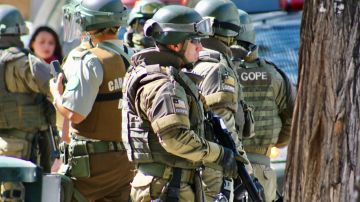Here’s What We Know About the Protests In Santiago, Chile
People have continued to protest in the capital city of Santiago, Chile after Chilean President Sebastian Piñera increased the price of metro tickets

Photo: Unsplash/@jorgefdezsalas
People have continued to protest in the capital city of Santiago, Chile after Chilean President Sebastian Piñera increased the price of metro tickets. However, this uprising is more than just anger over metro tickets, but rather the bigger issue of the socio-economic imbalance in the country. The protests, which began a week ago, have escalated. The Washington Post reported that at least eight people have died as a result of the protests.
While Piñera initially hiked the metro tickets from $1.12 to about $1.16, he has since rescinded his increase after the initial protesting began.
“We’re very aware that [those behind the riots] have a degree of organization, logistics, typical of a criminal organization,” Piñera said, according to the BBC, and called for a state of emergency. “I call on all my compatriots to unite in this battle against violence and delinquency. We’re at war against a powerful and implacable enemy who doesn’t respect anything or anyone, and who’s willing to use limitless violence and criminal acts.”
CIENTOS DE ESTUDIANTES VUELVEN A TOMARSE LAS ESTACIONES DE METRO EN SANTIAGO DE CHILE PARA QUE LOS USUARIOS VIAJEN GRATIS TRAS EL ALZA DEL PASAJE QUE SUPERA 1 DÓLAR, UNO DE LOS TRANSPORTES MÁS CAROS DE LA REGIÓN. LLAMADOS A EVASIONES MASIVAS SE ESPERAN PARA LOS PRÓXIMOS DÍAS. pic.twitter.com/95rOk8rR70
— Pao Dragnic (@PaolaDragnic) October 18, 2019
People in Santiago say their uprising has more to do with the history of oppression than with the increase in metro tickets.
“It’s not about 30 pesos,” Chileans are saying, according to The Washington Post. “It’s for about 30 years.”
“This was an economic pressure cooker that’s been building for decades, and it exploded,” Rodrigo Booth, a professor at the University of Chile, said in an interview with the publication. “This had little to do with public transit. It became a situation about brutal inequality.”
Over the weekend, more than 3,000 military and 5,000 national police were on the streets of Santiago to combat the protests.
Protests in Chile, Haiti and Ecuador prove that neoliberalism offers no future for our people.
Neoliberalism shifts the burden of capitalist economic crisis onto the poor. This, while fattening the pockets of wealthy multinational elites. pic.twitter.com/AwV35OBlot
— ANTICONQUISTA (@ANTICONQUISTA) October 21, 2019
According to the BBC, firefighters found five people dead inside a garment factory that was set ablaze by rioters, while other people were killed in a supermarket fire. Despite the reported deaths, people on the ground say the protests are far from over.
“Social injustice is everywhere.”
At least 8 killed as protests continue to rage against the cost of living in Chile. Read more on the unrest here: https://t.co/B3VCNk5etA pic.twitter.com/WXZUazdzGr
— Al Jazeera English (@AJEnglish) October 21, 2019
Today, people have begun marching in Santiago, with some calling for the resignation of the president.
“Incredible to see how national media are showing how everything has gone back to normal,” reporter Boris van der Spek tweeted. “Everything but: there are soldiers in the street, and social movements and workers unions are on strike and have announced marches for later today. This is far from over.”
#ChileDesperto : In Santiago, people are already marching: pic.twitter.com/1ylCjl1fYs
— Boris van der Spek (@BorisvanderSpek) October 21, 2019
Van der Spek added, “President #Piñera has given his full support to the army, declaring that ‘Chile is at war’. He ended his speech with ‘We are going to win this battle’ and that could provoke more violence from the protesters’ side. The hashtag #PiñeraRenuncia is trending.”

















